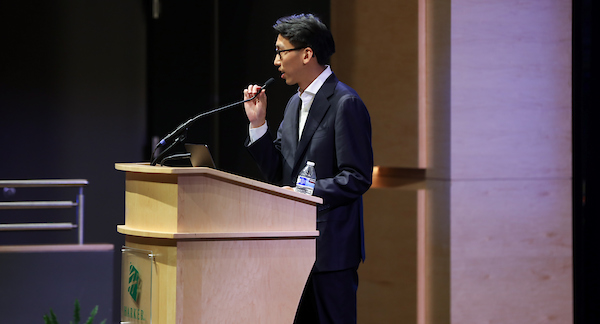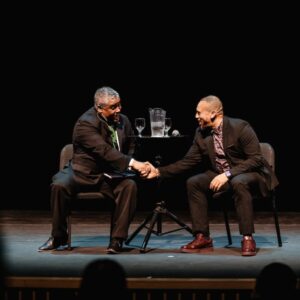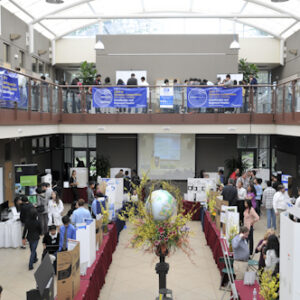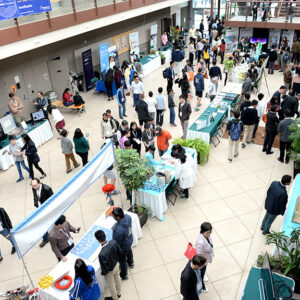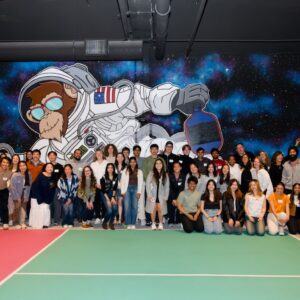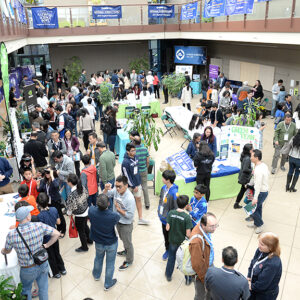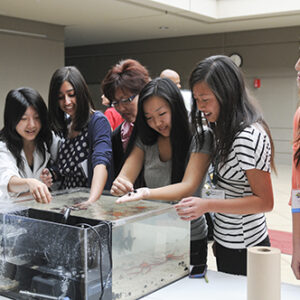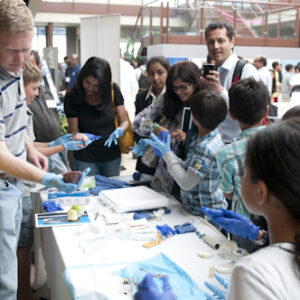By Janet Rae-Dupree
More than 600 registrants flocked to the upper school campus on April 12 for the 19th annual Harker Research Symposium: “AI Trends: The Future is Now.”
The event featured keynotes by tech luminaries, research presentations by a score of students, more than 50 student poster sessions, hands-on workshops taught by students for students, interactive displays by corporate exhibitors, freewheeling STEM Buddies science activities, and a raucous science magic show in the quad complete with dry ice and liquid nitrogen “explosions.”
MIT Media Lab Associate Prof. Ramesh Raskar opened the discussion with a look at “GOD AI” — short for global orchestration of decentralized AI. His keynote introduced intelligent agents, a rapidly expanding trend at the forefront of artificial intelligence. Just as mainframe computers evolved into desktop PCs and then into a decentralized worldwide web, AI is evolving rapidly from its isolation within massive tech companies to today’s chatbots and image generators and soon into “agentic AI” — assistants able to act on our behalf through collaborating with one another.
“We’re headed toward billions of AI agents — personal agents — that will work on your PCs on computing’s edge,” he said, noting that in just four months after Anthropic’s November 2024 introduction of MCP (model context protocol) to enable agent collaboration, more than 5,000 MCP servers were already operational.
Five participants in the “Shaping AI’s Future: Power, Ethics, and Opportunity” agreed that agents are at the forefront of how AI will reshape everything from research and healthcare to corporate enterprise and artistic creativity.
“Agents promise to completely change how we do our work,” said Anupam Datta, AI research lead at Snowflake and formerly a tenured professor at Carnegie Mellon University. Developers must seek ways to improve AI trustworthiness while working toward controlling bias, which is inherent in the data used to train AI.
Student presenter Linda Zeng, grade 11, noted that her research with large language models can help in that regard by boosting the trustworthiness of AI responses. As co-president of symposium organizer WiSTEM — Women in STEM, Zeng seeks to advocate for women as she works toward bringing AI resources to multilingual and diverse communities that often don’t have access to them. Zeng and co-president Sahngwie Yim, grade 12, emphasized that the symposium is a student-led production intended to bring together students, families, and professionals around a shared love of discovery and research.
With no judges or contests involved, the symposium is not about competition, said Assistant Head of School Jennifer Gargano. “Today is an intellectually stimulating day for the community to share knowledge,” she said. “This is when the community comes together to educate all of us.”
Symposium founder Anita Chetty said the day is meant to revolve around independent student research. “The scientific process is something you develop and nurture. Students need to go through the process themselves to understand failure and resilience and creativity and problem-solving. So many skills are outcomes of asking a research question and trying to find an answer.”
Andrew Jin ‘15 couldn’t agree more. Now vice president of engineering at Commure following that company’s acquisition of his startup Dorsal Health, Jin used the alumni keynote to urge students to consider “the value of going non-linear.” He had believed that he would pursue a career in academia, but instead found his passion at the intersection of AI and healthcare.
After playing an AI-composed song about Harker and its Eagles mascot, Box Head of AI Yashoda Bhavnani said agents already are reshaping entire industries, including the creative arts, software development, and medicine. “The agent era is here, and it’s only accelerating,” she said, encouraging students to “embrace curiosity” by assigning tasks to agents and experimenting with the results. Her co-presenter Brad Abrams, product leader at Anthropic, noted that the length of tasks an AI agent can do is doubling every seven months. “AI will surpass human intelligence in a few fields soon,” he said.
As symposium day concluded, students Zeng and Yim participated in a research panel with three classmates — seniors Shiven Balaji, Tiffany Gu and Varun Thvar. Thvar, who was named a 2025 Regeneron Science Talent Search Scholar, had presented his work about using machine learning to analyze the neurological effects of childhood trauma. He said Harker’s ability to bring younger students together with accomplished upperclassmen provides a unique opportunity to spark scientific passions early on. “Usually, these kinds of ideas and research don’t come into play until college or even after college,” he said. “Harker bringing it to students as early as possible makes all the difference.”
Janet Rae-Dupree is a science and technology writer based in the San Francisco Bay Area.
